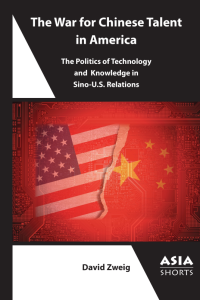Presented By: Lieberthal-Rogel Center for Chinese Studies
LRCCS Noon Lecture Series | The War for Chinese Talent in America
David Zweig, Professor Emeritus, The Hong Kong University of Science and Technology

Attend in person or via Zoom: https://myumi.ch/kZGGy
In the mid-1990s, China’s hope for a “reverse brain drain” of overseas scientists, academics, and entrepreneurs stalled. So, in 2001, Jiang Zemin introduced China’s ‘Diaspora Option,’ where PRC-born Chinese living abroad could “serve the country” without “returning to the country.” China’s vigorous efforts to gain the knowledge of these overseas Chinese have included an array of programs to encourage scientists, professors, and entrepreneurs living abroad to transfer their knowledge back home. Many Chinese working abroad complied, some to strengthen their former homeland, others from self-interest.
In 2018, the Trump Administration declared war on China’s efforts to access this information promoting a McCarthy-like campaign called the “China Initiative.” Hundreds of PRC-born scientists were investigated, their research careers were seriously harmed, and more than 100 were fired. Yet none were found guilty of espionage or theft of intellectual property. Dozens of cases never made it to court, lacking sufficient evidence.
This talk documents China’s “over-the-top” effort to gain the help of immensely talented Chinese who were living and working in the US, as well as the US government’s harsh counterattack, and its strategy to disrupt the transfer of US technology to China. The case studies include stories of unknown victims of that campaign whose cases were never made public. It also highlights the harm this war has brought to Sino-American scientific collaboration and the education of Chinese students in America.
David Zweig (PhD, The University of Michigan, 1983) is Professor Emeritus, The Hong Kong University of Science and Technology, Distinguished Visiting Professor of Taipei School of Economics and Political Science, National Tsinghua University, Taiwan, and Vice-President of the Center for China and Globalization (Beijing). He was a Postdoctoral Fellow at Harvard in 1984-85, and received the Humanities and Social Sciences Prestigious Fellowship, Research Grants Council, Hong Kong, 2013-14. For 15 years, he directed the Center on China’s Transnational Relations at HKUST.
He has surveyed hundreds of Chinese who returned home and many who remain abroad. In 2012, he briefed Li Yuanchao, Director of the Organization Department of the CCP, about why his 1000 Talents Plan was struggling. He was an expert witness in the defense of two Chinese professors under the “China Initiative.”
He has authored or edited ten books, including "Internationalizing China and China’s Brain Drain to the U.S." (Routledge). Over 40,000 students have taken his two online classes with COURSERA on domestic Chinese Politics and on China and the World.
His newest book, "The War for Chinese Talent in America: The politics of technology and knowledge in Sino-U.S. relations" came out in July 2024 in the Asia Shorts Series of the Association of Asian Studies, distributed by Columbia University Press.
If there is anything we can do to make this event accessible to you, please contact us. Please be aware that advance notice is necessary as some accommodations may require more time for the university to arrange.
In the mid-1990s, China’s hope for a “reverse brain drain” of overseas scientists, academics, and entrepreneurs stalled. So, in 2001, Jiang Zemin introduced China’s ‘Diaspora Option,’ where PRC-born Chinese living abroad could “serve the country” without “returning to the country.” China’s vigorous efforts to gain the knowledge of these overseas Chinese have included an array of programs to encourage scientists, professors, and entrepreneurs living abroad to transfer their knowledge back home. Many Chinese working abroad complied, some to strengthen their former homeland, others from self-interest.
In 2018, the Trump Administration declared war on China’s efforts to access this information promoting a McCarthy-like campaign called the “China Initiative.” Hundreds of PRC-born scientists were investigated, their research careers were seriously harmed, and more than 100 were fired. Yet none were found guilty of espionage or theft of intellectual property. Dozens of cases never made it to court, lacking sufficient evidence.
This talk documents China’s “over-the-top” effort to gain the help of immensely talented Chinese who were living and working in the US, as well as the US government’s harsh counterattack, and its strategy to disrupt the transfer of US technology to China. The case studies include stories of unknown victims of that campaign whose cases were never made public. It also highlights the harm this war has brought to Sino-American scientific collaboration and the education of Chinese students in America.
David Zweig (PhD, The University of Michigan, 1983) is Professor Emeritus, The Hong Kong University of Science and Technology, Distinguished Visiting Professor of Taipei School of Economics and Political Science, National Tsinghua University, Taiwan, and Vice-President of the Center for China and Globalization (Beijing). He was a Postdoctoral Fellow at Harvard in 1984-85, and received the Humanities and Social Sciences Prestigious Fellowship, Research Grants Council, Hong Kong, 2013-14. For 15 years, he directed the Center on China’s Transnational Relations at HKUST.
He has surveyed hundreds of Chinese who returned home and many who remain abroad. In 2012, he briefed Li Yuanchao, Director of the Organization Department of the CCP, about why his 1000 Talents Plan was struggling. He was an expert witness in the defense of two Chinese professors under the “China Initiative.”
He has authored or edited ten books, including "Internationalizing China and China’s Brain Drain to the U.S." (Routledge). Over 40,000 students have taken his two online classes with COURSERA on domestic Chinese Politics and on China and the World.
His newest book, "The War for Chinese Talent in America: The politics of technology and knowledge in Sino-U.S. relations" came out in July 2024 in the Asia Shorts Series of the Association of Asian Studies, distributed by Columbia University Press.
If there is anything we can do to make this event accessible to you, please contact us. Please be aware that advance notice is necessary as some accommodations may require more time for the university to arrange.